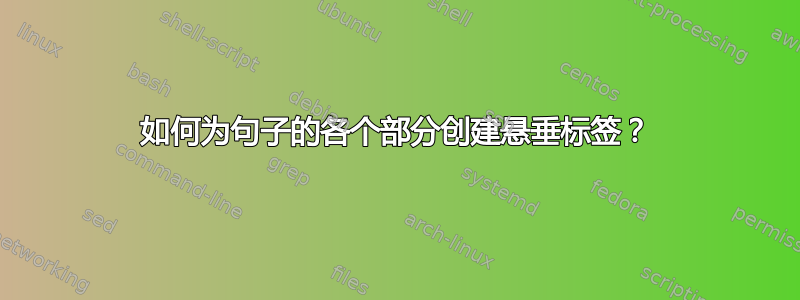
答案1
编辑:具有更多功能的较新版本是这里作为对后续问题的回答。
我编写了一个命令\mylabel,将内联文本作为第一个强制参数,将标签文本作为第二个强制参数。您可以使用可选\setmylabel参数全局自定义外观(针对当前组)或局部自定义外观(针对此用途)。
\documentclass{article}
\usepackage{blindtext}
\usepackage{tikz}
\usetikzlibrary{positioning}
% --------------- def options ---------------
\pgfqkeys{/mylabel}{%
% geometry
shift x/.initial = 1.5em,
shift y/.initial = .2em,
slope width/.initial = .3em,
text xsep/.initial = .1em,
text ysep/.initial = .1em,
label xsep/.initial = .3333em,
label ysep/.initial = .3333em,
%
% colors
line color/.initial = black,
text color/.initial = black,
label color/.initial = black,
color/.style = {line color=#1, label color=#1},
%
% label positions
/mylabel/pos/.is choice,
/mylabel/pos/above/.style = {pos=above right},
/mylabel/pos/below/.style = {pos=below right},
/mylabel/pos/below right/.style = {%
_anchor label = north west,
_direction = below,
_line pos = south,
},
/mylabel/pos/above right/.style = {%
_anchor label = south west,
_direction = above,
_line pos = north,
},
%
% internal
_anchor label/.initial,
_direction/.initial,
_line pos/.initial,
%
% struts
inline strut/.initial=\vphantom{Ap},
label strut/.initial=\strut,
}
\newcommand{\setmylabel}[1]{%
\pgfqkeys{/mylabel}{#1}%
}
% --------------- init options ---------------
\setmylabel{%
pos = below,
}
% --------------- \mylabel command ---------------
\newcommand{\mylabel}[3][]{% [#1: options], #2: inline text, #3: label text
\begin{tikzpicture}[baseline=(inline.base)]
% process options
\setmylabel{#1}
% draw text
\node[%
inner ysep = \pgfkeysvalueof{/mylabel/text xsep},
inner xsep = \pgfkeysvalueof{/mylabel/text ysep},
text = \pgfkeysvalueof{/mylabel/text color},
] (inline) {\pgfkeysvalueof{/mylabel/inline strut}#2};
\node (label) [
\pgfkeysvalueof{/mylabel/_direction} = \pgfkeysvalueof{/mylabel/shift y} of inline,
xshift = \pgfkeysvalueof{/mylabel/shift x},
anchor = \pgfkeysvalueof{/mylabel/_anchor label},
inner xsep = \pgfkeysvalueof{/mylabel/label xsep},
inner ysep = \pgfkeysvalueof{/mylabel/label ysep},
text = \pgfkeysvalueof{/mylabel/label color},
] {\pgfkeysvalueof{/mylabel/label strut}#3};
% draw lines
\draw[draw=\pgfkeysvalueof{/mylabel/line color}]
(inline.\pgfkeysvalueof{/mylabel/_line pos} west) -- (inline.\pgfkeysvalueof{/mylabel/_line pos} east)
(inline.\pgfkeysvalueof{/mylabel/_line pos}) -- ([xshift=\pgfkeysvalueof{/mylabel/slope width}] inline.\pgfkeysvalueof{/mylabel/_line pos} |- label) -- (label);
;
% set bounding box
\pgfresetboundingbox
\useasboundingbox
(inline.south west) rectangle (inline.north east)
(inline |- label.south) rectangle (inline |- label.north)
;
\end{tikzpicture}%
}
% --------------- test document ---------------
\setmylabel{%
line color = orange,
text color = blue,
label color = green,
}
\begin{document}
\blindtext
text \mylabel[pos=above]{part}{label~1} of a \mylabel{sentence}{label~2}
\blindtext
\end{document}
我建议将 def 选项、init 选项和 \mylabel 命令放在单独的文件中我的标签.tex在子目录中前言并将其包含在内\input{preamble/mylabel}。
编辑:为了进一步定制,您可以添加另一个 pgfkey
line/.initial =,
并将代码的第一行“绘制线条”替换为
\pgfkeys{/mylabel/line/.get=\tmpLineStyle}%
\expandafter \draw \expandafter [\tmpLineStyle, draw=\pgfkeysvalueof{/mylabel/line color}]
然后您有另一个选项,可以line向其传递诸如dotted、dashed、double、thick、等值(请参阅thinline width=2pt钛钾Z 文档第15.3节绘制路径)。您可以通过用逗号连接多个值来组合它们。如果值包含逗号或等号,则必须用括号括起来。
例如:
line = {thick, dashed},





